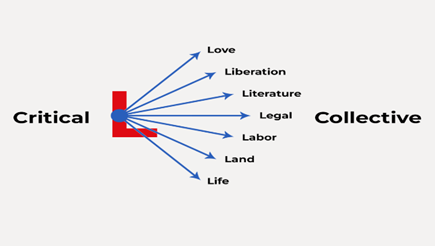
The Critical Legal Collective‘s Inaugural Conference will take place at Duke University School of Law on November 10-12, 2023 (applications for participation must be submitted by Sept 15, 2023, form at bottom of page).
Organizing for Democracy and Liberation: The Right to Learn, The Right to Teach, the Right to Thrive
In 2020, the murder of George Floyd sparked a historic wave of protests and resistance, foregrounding a consensus against white supremacy, racist police brutality, and anti-LGBTQIA+ hostility. Critical knowledge and practices fueled this powerful, celebratory consensus. It was informed by the insights of Black, Indigenous, immigrant and workers’ movements, more truthful accounts of U.S. history, dis/ability, gender, LGBTQIA+, and environmental justice efforts, as well as by Critical Race Theory and diversity, equity and inclusion initiatives. Nonetheless, a well- funded, reactionary response was swift, featuring miseducation and carceral campaigns that complemented ongoing efforts to undermine civil, voting, and worker rights. The campaigns’ goals: To suppress, silence, censor, exclude, and punish.
Yet again, an incendiary right-wing seeks to co-opt the law for anti-democratic ends. Enacting so- called divisive concepts legislation designed to hamper truthful teaching, learning, and collective power, the campaigns target for abuse students, teachers, Trans people, folks of color and women as individuals, groups and workers, among others. Steeped in the rhetoric and practice of white nationalism, supremacy and elite white monopoly of resources and opportunities, some parents, for example, have been allowed to ban books and prohibit children from learning the ugly facts about our history of discrimination and segregation, including the lessons that they teach. Teachers and professors, whose work is to educate students in the skills necessary for active and engaged lives in this democracy, have been threatened and even fired when they have taught authentic narratives and a more truthful history of the country. In this vein, CLC believes educators have a duty to teach students how to think critically and honestly, and that schools and universities have a duty to protect and expand critical studies. But the rights and freedom of students to learn as promised in Brown v Board of Education, and the right of teachers to teach and to participate in faculty self-governance as partially grounded in academic freedom are not the only rights in peril. Rather, the very lives of some people and their right to exist and thrive are also in peril.
The Critical Legal Collective, a national convening of scholars and activists, was formed during this reactionary moment. Its goals are to protect and advance critical studies and methods in the wake of continuing attacks on knowledge and multiracial democracy. Grounded in the experiences of diverse peoples whom elites often marginalize in law and society, critical studies endeavor to identify, analyze, challenge, and change inequitable socio-legal practices.
We thus support the right and freedom to learn, efforts to bargain for the common good and laws that deepen and expand a multiracial, multiethnic, multi-gendered ––a multi-valenced––democracy. This Fall, we invite you to join us in Durham, North Carolina from November 10-12, for the 2023 inaugural convention of the Critical Legal Collective at Duke Law School. We invite traditional programming under a Call to Action, rather than a Call for Papers. Reflecting and responding affirmatively to suppression of critical knowledge and networks in law and society, CLC will center projects in advocacy, pedagogy, and legal praxis, in addition to academic panels. The inaugural gathering will highlight and foster faculty, students, activists, clinics, centers, institutes, programs, community organizations, and other potential collaborators to form or strengthen the kinds of projects that advance the core mission of promoting, deepening, and defending access to critical knowledge in law, education, and society.
CLC’s four focus areas for discussion and strategy at the inaugural gathering are:
1. Education, Academic Freedom & Critical Justice as Essential Democratic Practices, subtopics include (1) building domestic and international solidarities through education and academic freedom as a pillar of democracy;(2) documenting the impact of the antidemocratic, “anti-Woke” campaign; (3) facilitating students’ rights to learn, vote, and participate in a healthy democracy; (4) constructing and theorizing beyond the traditional casebook (Con. Law); and (5) developing campus guidelines for controversial speakers
2. Collective Bargaining for the Common Good, subtopics include (1) grounding the practice of bargaining for the common good; (2) enhancing community co-governance mechanisms through legal clinics; (3) facilitating graduate student unions and beyond (4) identifying strategies for organizing academics as a unionized higher education workforce in solidarity with others; and (5) preparing faculty governance resolutions with the AAPF’s Truth Be Told Campaign.
3. Systemic Advocacy: ABA Standard 303, subtopics include (1) developing toolkits for schools to ensure robust and critical compliance with Standard 303; (2) researching and identifying strategies for working with and within the ABA to protect Standard 303 against reactionary culture war attacks; and (3) implementing and monitoring compliance with Standard 303.
4. Between a Rock and a Runaway Court: Critical Project Based Learning––Dobbs, Affirmative Action, and 303 Creative LLC, subtopics include showcasing and designing community and project-based learning workshops on Dobbs, Affirmative Action, and the 303 Creative LLC cases.
CLC welcomes proposals in which participants will (1) present and discuss projects that will enhance 2023’s four focus areas; (2) present panel discussions, roundtable discussions, papers or other types of presentations that touch on teaching strategies, community-based advocacy projects, and/or theories that enrich the inauguration themes; and (3) share interdisciplinary and restorative works (i.e., poetry, music, dance) relating to the theme…
To participate, please complete this form by September 15, 2023.
